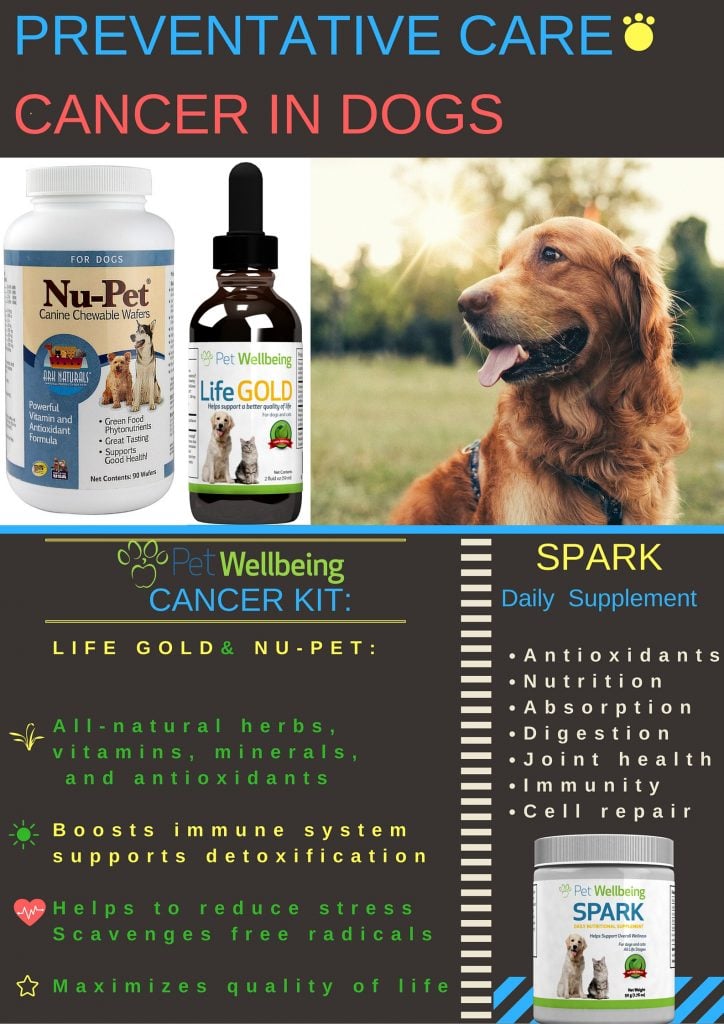
Cancer and your Pet (Preventative Pet Care)
Cancer and your Pet
Of all diseases that can strike our dogs, cancer is one of the most feared. In southwestern Ontario alone, human cancer has increased by 37% over the past 30 years, and animal cancer is following suit.
Why is this disease becoming such a major health problem in our dogs? One reason is because of their increased lifespan, but there are also several other recognizable causes.
Top 5 causes of cancer:
1. Toxins
The International Joint Commission and the Ontario Cancer Society have published articles on cancers with suspected environmental causes. The results showed that air pollution, pesticides, radiation, water treatment by-products, and chemicals such as arsenic and asbestos can be directly linked to some forms of cancer.
In dogs, exposure to pesticides such as 2-4 D has been linked to malignant lymphoma. Animals are particularly susceptible to pesticides because of their relatively small body size and because they are closer to the ground where concentrations of pesticides are highest. They also ingest pesticides while grooming.
Aromatic hydrocarbons (such as are found in "old generation" flea products) are known to cause bladder cancer in dogs. The development of bladder cancer is associated with use of flea and tick dips, flea and tick shampoos, obesity a year before diagnosis, and proximity of the dog's home to a marsh.
2. Over-vaccination:
Too many vaccines can contribute to a range of problems, including cancer.
3. Viruses:
Viruses can weaken the immune system and sometimes set the stage for cancer.
4. Genetics:
Certain breeds of dogs, such as boxers and retrievers, have higher rates of cancer than
others. Labrador and golden retrievers, for instance, are more likely to develop
lymphoma and malignant tumors of the spleen.
5. Aging:
As your animal ages, so does his immune system. This may lead to cancer because the
immune system fails to kill abnormal mutated cells that develop into malignancies.
How is canine cancer treated?
- Surgery is usually the treatment for solid tumors. The tumor may be completely removed or just "debulked" (made smaller). All tumors should be biopsied for an accurate diagnosis.
- Radiation involves using radioactive material to kill tumor cells. It is only effective against certain types of tumor. This kind of treatment is performed by a veterinary radiation specialist and is usually tolerated by most dogs.
- Chemotherapy is effective for some tumors. Generally, the goal is not to cure the cancer but to prolong the life of the dog. Most dogs tolerate chemotherapy very well and do not suffer the same side effects as humans. Nutritional and herbal support can help minimize what side effects there are.
What about natural therapies?
Natural therapies are used to boost the immune system and slow the spread of the cancer. They can be used in conjunction with the conventional treatments above.
- Diet plays a key role in cancer treatment as well as prevention. Holistic practitioners will recommend a natural diet high in protein and fat and low in carbohydrates. You can feed a high quality canned or dry food, or a raw frozen diet.
- Supplements used in cancer patients include high dose Omega-3 fatty acids (usually fish oil source), glycoproteins and antioxidants. Antioxidants work by breaking down the "free radicals" that are toxic to the body’s cells. This helps neutralize the effects of the cancer. A specific group of antioxidants called bioflavonoids helps break down fats and decrease inflammation.
- Acupuncture and herbal therapies can be useful for treating pain and prolonging life in cancer patients. For these therapies, you must consult a skilled practitioner trained in veterinary acupuncture and herbs.
- Cancer can be frightening, but it doesn’t have to be a death sentence. There are ways you can help minimize your beloved companion’s risk of developing this dreaded disease – check out the sidebar!
What can you do to prevent canine cancer?
1. Choose a good, natural diet free of chemicals and additives. A homemade diet balanced by a veterinary nutritionist is best. Supplement this diet with Omega-3 fatty acids, antioxidants and bioflavanoids.
2. Ensure your dog has adequate exercise and clean, pure water. Consider using distilled water.
3. Limit his exposure to toxic chemicals such as topical flea products.
4. Remember that many household cleaners can also be toxic.
5. Keep your dog away from lawns that have been sprayed with pesticides and herbicides.
6. Limit his exposure to low level electromagnetic radiation.
Pet Wellbeing Recommendations
All-natural support for dogs living with cancer
Life Gold Cancer Support:
- Life Gold Helps Manage Symptoms Of Canine Cancer
- Supports the immune system
- Supports vital systems of detoxification
- Helps to reduce oxidative stress
- Scavenges free radicals
- Supports antioxidant function
- Promotes long-term health
- Helps to re-establish the essence of a healthy, vibrant life
- Antioxidants are essential for cancer support! Pet wellbeing also offers a comprehensive Cancer Kit for Dogs, learn more and find many reviews on how these products together helped to make a difference for pets when it counts the most: http://www.petwellbeing.com/products/dog-cancer-kits



